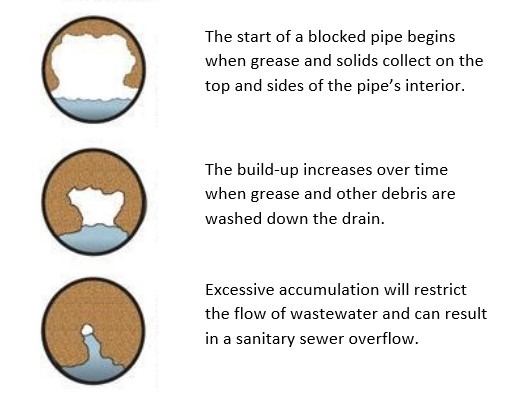Waste Water
Sanitary sewers are an underground pipe system that carries wastewater from the plumbing of homes and businesses to the sewage treatment plant for treatment and cleaning.
Items that are not human waste, water or toilet paper can cause flooding in your home or business. They can also cause blockages and backups in our sewer system. Both are costly to repair.
| Fats, Oil and Grease (FOG) |
|
An easy and important way we can have a positive impact on the environment is by properly disposing of fats, oil and grease, also known as FOG. When FOG is washed down the sink or toilet into the plumbing system they cool, harden and stick to the inside of sewer pipes. Over time, the grease will build up and can block the entire pipe – both on your property and on City’s property.
Where FOG can be found...
How should FOG be handled at home?
|
| Think Before You Flush |
|
Our sanitary sewer system is not designed to dispose of anything other than human waste, toilet paper or wastewater. You should not dispose of other items, even if they claim to be disposable. Some items, such as cotton balls, disposable wipes and feminine hygiene products may seem easy to flush down the toilet. However, they can cause blockages in the sanitary sewer system and should be thrown in the garbage. Top hygiene items that should not be flushed and rather be placed in your garbage:
|
| Wipes in Your Pipes |
| Bathroom wipes, considered an alternative to toilet paper, are often advertised as disposable. Do not flush wipes down the toilet as they do not break down like toilet paper. They can collect in the sewer system and cause blockages and backups. |
| Hazardous Waste |
|
The following household hazardous waste should never be flushed down the drain:
|


